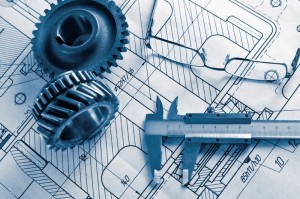The manufacturing cluster contains jobs that involve turning raw materials into final products that are sold to buyers. Manufacturing work refers not only to the people who make the products, but the many people in management, engineering, design, and other areas. Manufacturing workers come up with product ideas, test products to make sure they are assembled properly, and manage the shipment and receipt of manufactured goods. Manufacturing covers a wide range of industries, including food, beverage, pharmaceuticals, iron and steel, textiles, lumber, tobacco, automobiles, aerospace, and petrochemicals. In manufacturing, there are two types of goods produced: durable and nondurable. Durable goods have a long life span and hold up over time. Examples of durable goods are cars, airplanes, and washing machines. Nondurable goods have a shorter life span and include such products as food, cosmetics, and clothing.
Manufacturing Career Pathways

Manufacturing Career Cluster
The manufacturing cluster contains six career pathways: health, safety, and environmental assurance; logistics and inventory control; maintenance, installation and repair; manufacturing production process development; production; and quality assurance.
Health , Safety, and Environmental Assurance Career Path
Workers in this area maintain the safety of manufacturing workplaces and products. They conduct health and safety inspections, teach employees safe working practices, and plan for removal of harmful materials according to the latest laws and regulations. Examples of careers in this area include environmental engineers, health and regulatory inspectors, and industrial safety and health technicians.
Logistics and Inventory Control Career Path
Logistics refers to the planning and actual movement of materials to and from manufacturing sites. Inventory control deals with the receipt, delivery, and monitoring of raw materials and finished products. Logistics and inventory control workers keep raw materials and finished products moving in and out of manufacturing facilities and ensure that all of these materials are well accounted for. Examples of careers in this area include industrial traffic managers, inventory control specialists, quality control engineers and technicians, and shipping and receiving clerks.
Maintenance, Installation, and Repair Career Path
Most manufacturing operations involve machinery and technical equipment. Such machinery and equipment requires routine maintenance, repair, and upgrades. Maintenance, installation, and repair workers install and maintain manufacturing equipment. They run regular tests to evaluate the condition of the equipment, make recommendations for the purchase of new equipment, and troubleshoot any problems that come up in a business’s day-to-day operations. Examples of careers in this pathway include instrumentation technicians, millwrights, systems setup specialists, and telecommunications technicians.
Manufacturing Production Process Development Career Path
This is the design segment of the manufacturing industry. The people in this pathway design the goods the manufacturing sector produces and the production processes used to produce them. To do this, they interview potential customers and evaluate similar products and processes to decide where they can make improvements. They also collect feedback from existing customers to make sure that products are meeting their needs and are being delivered in the most efficient and timely way possible. Examples of careers in manufacturing production process development include industrial designers, industrial engineers and engineering technicians, and operations research analysts.
Production Career Path
Production workers assemble raw materials into finished products. They may use machinery, computer systems, hand tools, welding, or do the work by hand. Examples of careers in this area include automotive industry workers, glass manufacturing workers, manufacturing supervisors, and precision machinists and metalworkers.
Quality Assurance Career Path
Like health and safety workers, quality assurance workers ensure that manufacturing processes and products adhere to established safety guidelines. They also test products to make sure they are of an acceptable quality and make sure that the manufacturing process yields goods in a timely manner. Customer satisfaction is foremost in quality assurance workers’ minds. Examples of work in this pathway include instrumentation technicians, quality assurance testers, and quality control engineers and technicians.
Browse all Career Pathways.
Exploring Manufacturing Careers
A great way to get a look into manufacturing careers is to ask your teacher or guidance counselor to arrange a field trip to a local factory. There you can observe the various jobs available in a manufacturing workplace and ask employees about their experiences firsthand.
Jobs in manufacturing call for different skills depending on the career pathway in which you work. For example, working in design or development requires creative thinking and usually a degree in industrial design or business management. Careers in manufacturing may require a high school degree and top-notch coordination, physical agility, and decision-making skills. Work in management may call for an advanced degree, such as a master’s in business administration (M.B.A.) degree.
Manufacturing Careers Outlook
Manufacturing jobs are on the decline as factories relocate to foreign countries with less labor and material costs. As a result, labor unions have lost some of their strength to negotiate for better contracts and wages for manufacturing workers. Automation is another key reason for the decrease in factory jobs. To cut labor costs, manufacturers are replacing much of their labor force with robotics-based machinery. In many cases, these machines are more efficient and productive than human workers. In order to remain competitive, many companies are striving to become even more automated, which will in turn eliminate even more jobs. However, while many assembly line jobs will disappear, the demand for engineers, the individuals who program, install, and maintain the automated machinery, should be strong.
According to the U.S. Department of Labor, employment in manufacturing will be best in the area of pharmaceuticals. A growing population, particularly among the elderly, and the frequent introduction of new drugs to the public will continue to bolster the pharmaceutical market. Advances in medical research and treatment of disease will also benefit this area.
Return to Career Clusters list.